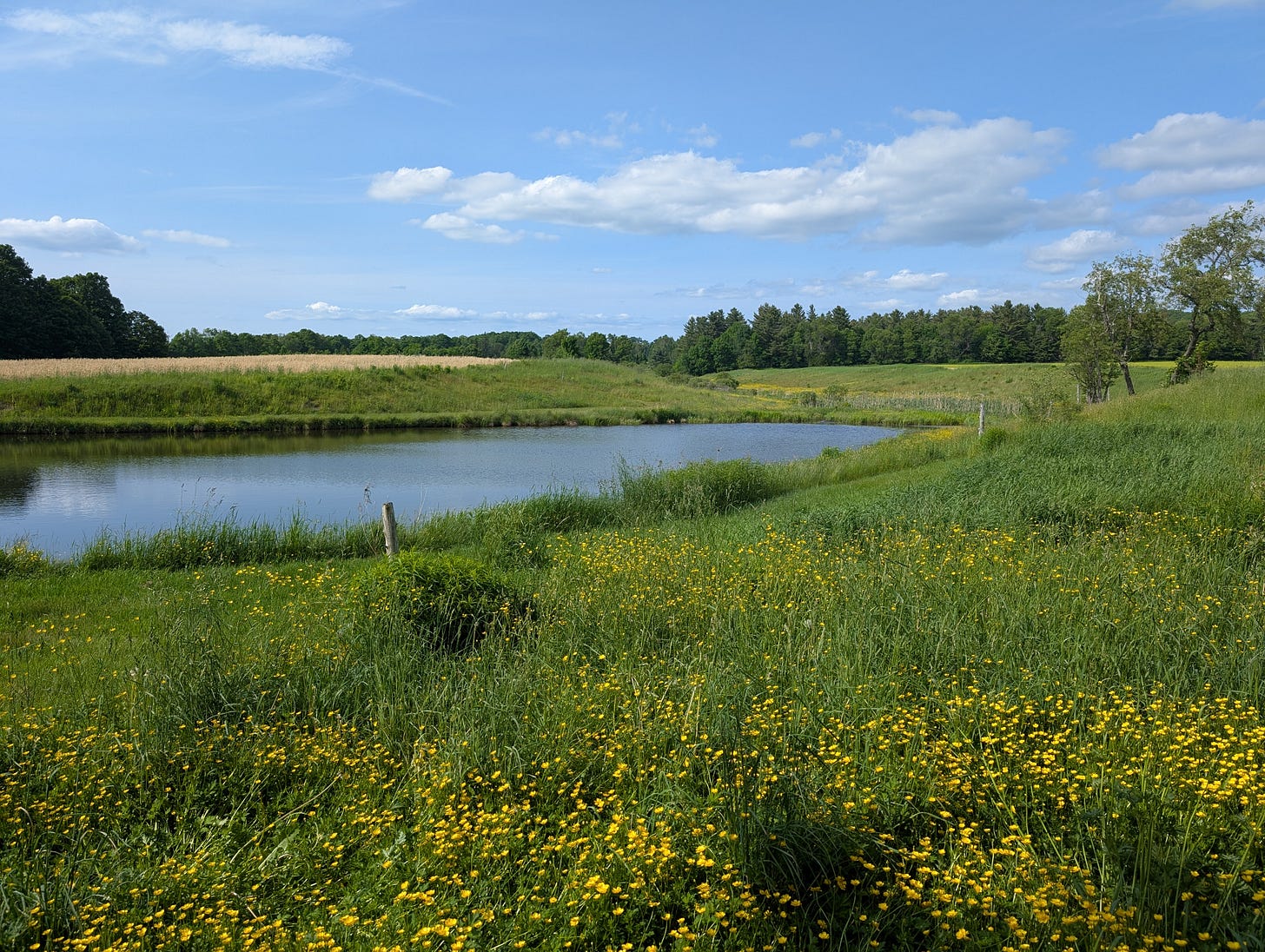Declare How Much
The relationships behind the demoniac, Jesus, and the wedding feasts
Then they arrived at the region of the Gerasenes, which is opposite Galilee. As he stepped out on shore, a man from the city who had demons met him. For a long time he had not worn any clothes, and he did not live in a house but in the tombs. When he saw Jesus, he cried out and fell down before him, shouting, “What have you to do with me, Jesus, Son of the Most High God? I beg you, do not torment me,” for Jesus had commanded the unclean spirit to come out of the man. (For many times it had seized him; he was kept under guard and bound with chains and shackles, but he would break the bonds and be driven by the demon into the wilds.) Jesus then asked him, “What is your name?” He said, “Legion,” for many demons had entered him. They begged him not to order them to go back into the abyss.
Now there on the hillside a large herd of swine was feeding, and the demons begged Jesus to let them enter these. So he gave them permission. Then the demons came out of the man and entered the swine, and the herd stampeded down the steep bank into the lake and was drowned.
When the swineherds saw what had happened, they ran off and told it in the city and in the country. Then people came out to see what had happened, and when they came to Jesus, they found the man from whom the demons had gone sitting at the feet of Jesus, clothed and in his right mind. And they became frightened. Those who had seen it told them how the one who had been possessed by demons had been healed. Then the whole throng of people of the surrounding region of the Gerasenes asked Jesus to leave them, for they were seized with great fear. So he got into the boat and returned. The man from whom the demons had gone out begged that he might be with him, but Jesus sent him away, saying, “Return to your home, and declare how much God has done for you.” So he went away, proclaiming throughout the city how much Jesus had done for him.
Luke 8:26-39
I’m grateful to everyone who helped my wife and me have a wonderful wedding week here in Vermont. The phrase I’ve been using all week is that it’s “the best kind of surreal”; I imagine that is also what the kingdom of God in heaven must be, too.
It’s been a joyful reminder that one of the main analogies the gospels use for the kingdom of God is a wedding feast. The point isn’t the food being served, but the people we are gathered with in the kingdom of God—family, friends, strangers, saints and sinners, anyone who accepted the invitation to this joyful union between God and his people.
Probably my favorite bit of wedding advice this week was courtesy of my Uncle John, who in paraphrasing Martin Buber shared some advice: “The relationship is more important than what’s being related.” In other words, while surely the specific content of the words matter—use “I” language when in disagreement, listen closely and repeat back to make sure you heard them clearly—even the most thoughtful, careful words we use are only a reflection of the health of the relationship. And yes, Presbyterians in all our committees and democratic processes are supposed to be exemplars of this. We don’t always have control over the “what” of life, but we can choose “how” we live it together in love.
I hope to carry this into my marriage, but I also hope it will help us unpack today’s strange story in Luke 8 of this Gentile man from Gerasa. There is a lot of strange “what” here—demons, pigs, demons going into pigs, pigs going into the ocean, and also strangely, a man who had been cursed with demons being healed and people being upset about it. Say what now?
The content here is undoubtedly strange. And it is symbolically rich, important, and layered, which would make for a very full Bible study. But also, the “what” of this story is only a reflection of the relationships underneath. Where might we see ourselves in the relationships in this story?
Let’s start with the state of the man when we find him. He's tortured, living outside of town naked and in chains, sometimes his demons giving him false freedom from some chains only to be bound up again, all the while absolutely captured by his real demons.
The man is so captured by his demons that he thinks Jesus, the antidote, is the real torture. “What have you to do with me, Jesus, Son of the Most High God? I beg you, do not torment me.” (8:28) He's so lost in his torment that he feels freedom as a threat. And I wonder how many of us when we have been bound and tortured by our demons, see Jesus coming, the one who knows exactly what our demons are, and we recoil and run away, almost as if a part of is saying, “Stay away, Jesus; leave me be with the torture I know, for what I know is comfortable.” We can be so lost in our bondage that we don’t even know what true freedom is.
I think a strange thing for me preaching this today is that I know many of my friends and family are listening who know I was a man wild in my chains. Whatever the truth of it was, I might as well have been demon-possessed throughout much of my twenties. Bondage of selfishness, chasing, empire-building, addictions, and more. It was, indeed, a whole Legion of things. And when I first was getting back into Christianity, it took me a while because I also had some of this man’s reaction: “What do you want, Jesus?”
But one of the things I find an intriguing mystery in this story: is there only one demon-possessed man here? Because when Jesus destroys the demons through the pigs into the ocean, and leaving him “clothed and in his right mind” at the feet of Jesus, (8:35) what is the reaction of the crowd? The same as the man who had demons: fear. They’re just as frightened as he was. So what does the crowd do? They ask Jesus to leave them. And so I wonder: are there more demons in this story than meet the eye?
If you’ve ever undergone radical positive change in your life, you know there will sometimes be people who seem to prefer you as a demon, on the outskirts of town, rather than transformed. Sometimes the hidden demons we have might be unsettled by seeing them cured in another.
Maybe this all sounds too “out there,” too spiritual to some of us. Maybe it’s simpler, more basic, more transactional. After all, these pigs were quite the livelihood to their herders. They lost their hard-earned swine-herd. For us Vermonters, imagine Jesus drove a bunch of tractors into Parker Pond in order to save a man’s soul. Would everyone be happy? Wouldn’t even a part of you say, “Maybe there was a better way to do that”? Forget the man’s dignity and sanity and being ready to serve, what about my stuff? As the Geneva Study Bible’s notes say, “Foolish men for the most part will not redeem this so excellent grace freely offered unto them if it means the loss of even the least of their wealth."
And so for one reason or another, psychospiritual or simply economic, the people don’t want Jesus around. He’s bad for business. They beg him to leave.
These are all the human relationships going on underneath the weird “what” of our story. But let’s ask the same question the man asked — “What have you to do with me, Jesus?” In a very surprising twist to this gospel story, the answer is not “follow me” as the man wants—or is it? Jesus says, “Return to your home, and declare how much God has done for you.” For some are called to be apostles out in the world, but some are called to be apostles in our inner world in our community. Perhaps this is what it means for this particular man follow him.
That is something my wife and I truly wanted, whether we accomplished it or not, in our human wedding we had this week. We wanted to read Psalm 126 and declare “God has done great things for us!", not even knowing that this gospel story would come on the lectionary calendar this week. We just wanted you to know how much Jesus had done for us. And maybe it was a little weird to some of you given how you once knew us. All I know is that I hope when I see other people being healed from their demons, I let myself be “freaked out” in a holy way; even though I know God has done great things for me, and maybe you feel totally comfortable and fine in your life, maybe none of us know whether we’re in the crowd on the outside, or we’re the man in chains in the tomb, or if it even makes a difference, because we all need a relationship with the Jesus who unsettles us outside of our comfort zone.
And if—and when—Jesus sets you free, you may not know how to tell your story. You may not use the right words. You may try to tell people and it just doesn’t make any sense, or seems too forward, or too “evangelistic,” or something outside of your comfort zone. But you can still declare “what God has done for you” through your love and relationship to your community. For some people may only come to know Jesus through you. They may only know Jesus beyond the words and the specifics of anything you can possibly say, all of us grasping and groping to describe the undescribable mystery of Christ. They may know Jesus by knowing nothing else except how he transformed you from your tragedy into wholeness. And let us remember that the words we use for Jesus—the “what”—only matters if the relationship, the “how,” is truly of him and in him. For “how much” God has done for you is only truly known by the love in his “how.”
So let Jesus call you out, too, and remember how much God has done for you. Declare it to all you know. You may never find the perfect words that point to Jesus. But you can remember it and declare it through Christ’s saving grace for you, for all of us, gathered together in his true wedding feast.






